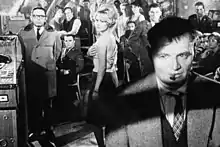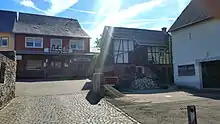| Black Gravel | |
|---|---|
 Wolfgang Büttner, Anita Höfer, Heinrich Trimbur in Black Gravel | |
| German | Schwarzer Kies |
| Directed by | Helmut Käutner |
| Screenplay by | Helmut Käutner Walter Ulbrich |
| Produced by | Walter Ulbrich |
| Starring | Helmut Wildt Ingmar Zeisberg |
| Cinematography | Heinz Pehlke |
| Edited by | Klaus Dudenhöfer |
| Music by | Bernhard Eichhorn |
Production company | |
| Distributed by | UFA |
Release date |
|
Running time | 111 minutes |
| Country | West Germany |
| Language | German |
Black Gravel (German: Schwarzer Kies) is a 1961 West German drama film directed by Helmut Käutner and starring Ingmar Zeisberg and Anita Höfer. The screenplay was written by Käutner and Walter Ulbrich. The film was shot in Lautzenhausen, Germany.[1]
The film's sets were designed by the art director. While the interiors were shot at the Tempelhof Studios in Berlin, location shooting took place at Hahn Air Base.
Plot
The story takes place in postwar Germany, following Germany's loss in World War II. For years, people struggled with shortages of everything, housing, water, food, clothing. A military base for several thousand American soldiers is going to be built in the village of Sohnen. The locals eye them suspiciously, nonetheless recognizing the economic potential.[1] Numerous individuals find ways to serve (and service) the Americans, turning barns into bars, becoming prostitutes, building the new airbase. Robert Neidhardt, who owns a truck, starts selling gravel on the black market. Robert flees during a police raid, causing a fatal accident. He keeps going, fleeing further, becoming more ruthless, causing the death of a couple.

Charges of antisemitism
Käutner attempted to show postwar Germany as it was, gritty, smarting from defeat, still encumbered by antisemitism,[1][2] despite the denazification efforts. However, the Central Council of Jews in Germany protested against the film and filed a criminal complaint, labeling the portrayal of antisemitism as the expression of it and citing the treatment of a character (Loeb) who is a Nazi concentration camp survivor and who is called a "dirty Jew"[1][2] by "der alte Rössler" ("old man Rössler"). Though the director and producer said the Council misunderstood their intent, and the general secretary of the Council said he found the movie "much more anti-German than anti-Jewish," all the scenes with Jewish references were cut from the film.[1]
In an issue of Der Spiegel published at the time the movie was released, an article called "Slice of Life" ("Eine Scheibe Leben"), begins with the scene in question.[1]
The camera travels through the smoky haze of a tavern, at the tables, US soldiers and fräuleins are hanging out. Playing from the jukebox for several minutes is marching music and a farmer, his walking stick slung over his shoulder like a weapon, marches in place in front of the record player, enjoying the fond memories. Finally, the tavern owner admonishes him, "Okay, time for another record... The Yanks are already complaining." The farmer: "The Yanks can kiss my..." The tavern owner bends over and pulls the plug out of the wall. The music stops. The old man curses, "Dirty Jew!"
— Scene from Black Gravel described in Der Spiegel, 26 April 1961
Not until 2009 was the originally premiered film shown again, after an uncut version was uncovered.[2]
Partial cast
- Helmut Wildt as Robert Neidhardt
- Ingmar Zeisberg as Inge Gaines
- Hans Cossy as John Gaines
- Wolfgang Büttner as Otto Krahne
- Anita Höfer as Elli
- Gisela Fischer as Margot
- Ilse Pagé as Karla
- Heinrich Trimbur as Eric Moeller
- Peter Nestler as Bill Rodgers
- Edeltraud Elsner as Anni Peel
- Else Knott as Frau Marbach
- Guy Gehrke as Wiechers, Jr.
- Karl Luley as "der alte" Rössler
- Max Buchsbaum as Loeb
See also
- The Golden Plague (1954)
References
- 1 2 3 4 5 6 "Eine Scheibe Leben". Der Spiegel (in German). 26 April 1961. Retrieved 4 September 2021.
- 1 2 3 "Wiederentdeckt: Schwarzer Kies" (in German). German Historical Museum. Archived from the original on 24 October 2009. Retrieved 13 March 2012.
External links
- Black Gravel at IMDb
- Wiederentdeckt 149: Schwarzer Kies CineGraph (in German)
- Stills from the film (in German)